#o&039;connell street
Explore tagged Tumblr posts
Text
#OTD in 1949 – The Republic of Ireland withdraws from the British Commonwealth. The British Parliament recognises the declaration but asserts sovereignty over the six northern counties.
The withdrawal of the twenty-six counties from the British Commonwealth is recognised officially by Britain, thereby, becoming the independent Republic of Ireland. The Ireland Act 1949 passed by the House of Commons recognised the withdrawal. Éamon de Valera had introduced his Constitution (Bunreacht na hÉireann) in 1937, the Irish Free State, or Éire as it was renamed, was well-nigh an…
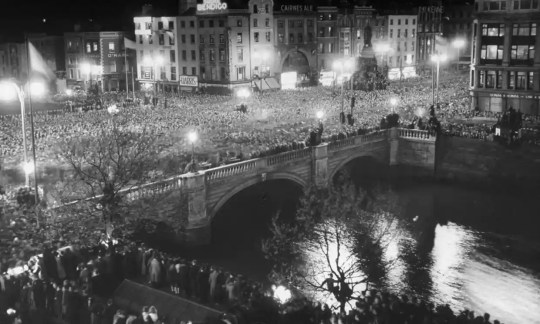
View On WordPress
#Éamon De Valera#Éire#British Commonwealth#Bunreacht na hÉireann#Constitution of Ireland#Dublin#House of Commons#Ireland Act 1949#Nationalists#Northern Ireland#O&039;Connell Bridge#O&039;Connell Street#Republic of Ireland#Tim Pat Coogan#Ulster#Withdrawal
12 notes
·
View notes
Text
NOT NAMED AFTER A PRINCESS BUT AFTER TWO PRINCES -229573-1
Princes Street North, a historic gem off O'Connell Street, offers a fascinating blend of past and present for locals and visitors alike.
PRINCES STREET AS IT IS IN 2024 It should be noted that I have included, in this series of photographs, images of a narrow lane that connects North Princes Street to Middle Abbey Street as well as the GPO Arcade. The laneway is named William’s Lane and while many accounts claim that it is no longer shown on maps I checked Google Maps and it is identified. And while no one appears to know why it…
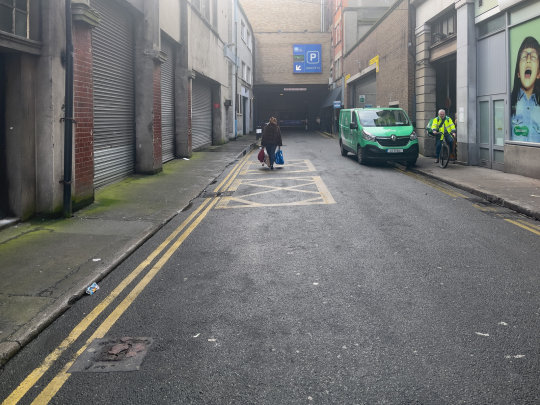
View On WordPress
#1916 rising#Apple#Art Deco Dublin#Dublin Architecture#Fotonique#GPO Arcade#History of O&039;Connell Street#Infomatique#iP{hone 12 Pro Max#Ireland#March 2024#Middle Abbey Street#North Princes Street#Princes Street Dublin#Streets Of Dublin#William Murphy#William&039;s Lane Dublin
0 notes
Text
Coronavirus. 104° Anniversario dell'Easter Rising celebrato in una Dublino deserta
Coronavirus. 104° Anniversario dell’Easter Rising celebrato in una Dublino deserta
La cerimonia, seguendo le linee guida imposte dall’HSE a causa dell’epidemia di Covid-19, è stata trasmessa in diretta da Áras an Uachtaráin e dal GPO Una preghiera è stata recitata nel cortile interno del General Post Office dal cappellano delle forze armate, padre Seamus Madigan mentre il proclama di indipendenza è stato letto del capitano Darren Reilly davanti al GPO in una O’Connel Street…
View On WordPress
#coronavirus#covid-19#Dublino#Easter Rising 1916#General Post Office#gpo#ireland#irlanda#O&039;Connell Street#the journal
0 notes
Text
UP IN DUBLIN, STREET SCENES
#Dublin Days, Scenes on the street below the 40 weathers in a single day... #Hometown #Exploring #Colour #Life #Photography #Ireland #IrishTourism DOWN IN DUBLIN, STREET SCENES



















All photographs by Damien B. Donnelly
View On WordPress
#Anna Livia Statue#architecture#colour#Customs House#DART#Dublin#Grafitti#Ha&039;Penny Bridge#Heuston Station#Ireland#Irish Life Fountain#Jameson Brewery#Liberty Hall#O&039;Connell Street#river liffey#sculpture#Smithfield#Street scenes#Weather
0 notes
Text
What Dublin is?
Dublin is the capital of Ireland crossed by the river Liffey that is important for the merchant trades. This river divides the city in two parts: the south side is characterized by historic monuments, touristic places and funny pubs; this is the ideal part for young people and tourists who’d love enjoy their holiday. On the other hand, the north side hugs the more modern and contemporary neighborhoods. These two sides are divided by a bridge.

LET’S TALK ABOUT THE MAIN ATTRACTIVENESS!!
1. TEMPLE BAR
The main entertainment district in Dublin that is the meeting point for musicians, street artists, younger people, adults who’d like to enjoy bars, coffee shops, and also restaurants and galleries of fashion and art. Here people can visit the Gallery of Photography, the National Photography Archive and the Irish Film Institute.
This district is an explosion of culture, fun, art and innovation. During the day it’s an explosion of happiness where people can have a walk seeing the colors of this place (the most important is the red) and, especially during the summer, all walls are covered with multicolored and bright flowers on their tops.
Temple Bar is the principale place both in the day and in the night. Mostly in the night it becomes full of colored lights, pleasant noises, people and irish pub’s music. Inside the pubs it’s common to listen live music and to see singers who love drink a Guinness between one song and the next.
The most important pub here is Temple bar. Most visitors to Dublin inevitably find their way to Temple Bar – the most popular area of the city – and filled with a wide array of bars and restaurants. Established in 1840, this pub is among the most frequently visited and photographed in the country. Moreover, walking around it or taking a beer, people can discover a good reason why this is the most popular pub: live music. Singers have the tradition to play the best and famous Irish songs such us “The Fields of Athenry” and “It’s a Long Way to Tipperary”.
2. THE OLIVER ST. JOHN GOGARTYS
Situated in the heart of the quarter of Temple bar, this is an international hostel and also one of the most important traditional irish music pub. The main difference from Temple Bar Pub, is his color. It’s a sparkling yellow, but to be precise, the yellow of the first part down tends towards the green, while the top is a cream color. Obviously people will notice it for its color (different from other walls), but even because the Oliver St. John Gogartys is surrounded by flags representing Usa, England, Italy, Germany and many other countries.
This slideshow requires JavaScript.
3. GRAFTON STREET
Grafton St is the main and exclusive shopping street in Dublin: people who love international brands such us Dunnes and Brown Thomas must go there. Furthermore it’s a link between the Trinity College and St. Stephen’s Green. However in the past it was a residential street, and only few years later it became famous for boutiques and brands. People usually decide to have their meeting point at the Molly Malone Statue, famous for her history. She was a fishmonger in the morning at the Howth village and a prostitute in night. Tradition wants that she died when she was still young a cause of a strong fever and, people tell, her ghost continues to walk around the Dublin City. Moreover Marks & Spencer, always in Grafton St, could be a great option if tourists desire to take a coffee on the rooftop after shopping!!
4. THE SPIRE
Situated in the middle of O’Connell Street, it’s 120m high and 3m in the diameter at the base, people gave it a title of “Monument of the Light” because it’s made of steel and reflects the light of sun every hour. This is the highest and bigger monument in Europe.
DUBLIN, amazing surprise! What Dublin is? Dublin is the capital of Ireland crossed by the river Liffey that is important for the merchant trades.
#attractiveness#cities#città#Dublin#Dublino#Gogartys#Grafton Street#Ireland#irlanda#molly malone#monumenti#monuments#O&039;Connell Street#pubs#Spire#statue#streets#temple bar#the spire#visit
0 notes
Text
An Afternoon near O'Connell Street, Dublin, Ireland
An Afternoon near O’Connell Street, Dublin, Ireland
Thanking the driver of the double-decker bus we hopped off on to the sidewalk. In every direction the noisy congested 4-lane thoroughfare was packed with people, bicycles, double-decker buses and rows upon rows of brownstone buildings one on top of the other. This is O’Connell street! Is a busy thoroughfare in the heart of Dublin. It’s odd slender shape mounted directly in the centre of…
View On WordPress
#Book of Kells#checking the map#double decker bus#Dublin#Fellows Square#Four Evangelists#gospel passages#Ireland#Latin based text#Nassau Street#O&039;Connell Bridge#O&039;Connell Street#Parliament Square#rain jackets#river ferry-boat#the Gospel of Jesus Christ#The Spire#Tourist#Trinity College#Walking Dublin
0 notes
Text
In order to understand the sectarian violence that plagued Belfast and Northern Ireland for many years, you have to start one hundred and three miles to the South in the city of Dublin. The conflict known as the troubles, involved mostly Protestant loyalists, who wanted to remain part of the United Kingdom, against mostly Catholic republicans, who wished to unite with the Republic of Ireland.
In 1916, on Easter Monday in Dublin, the Irish Republican Brotherhood, a secret organization of Irish nationalists led by Patrick Pearse, launches the Easter Rebellion, an armed uprising against British rule. Assisted by militant Irish socialists under James Connolly, Pearse and his fellow Republicans rioted and attacked British provincial government headquarters across Dublin and seized the Irish capital’s, General Post Office. Following these successes, the Irish nationalists proclaimed the independence of Ireland, which had been under the British rule for centuries, and by the next morning were in control of much of the city.
Later that day, however, British authorities launched a counteroffensive, and by April 29 the uprising had been crushed. Nevertheless, the Easter Rebellion is considered a significant marker on the road to establishing an independent Irish republic. Following the uprising, Pearse and 14 other nationalist leaders were executed for their participation and held up as martyrs by many in Ireland.
While walking on O’Connell Street in the Irish Capital of Dublin, one summer evening, I asked for directions to a ATM from a local resident. He gave me directions which to my surprise it was on the same block. While waiting on a cab, strangely he approached me and started to tell me about the Easter Rising and explained that evidence of the uprising was still on this street. He explained that the bullet holes on the angles on the O’Connell Monument were from the 1916 uprising. He informed us of the bullet holes in the are still in the side of the building of the General Post Office and told us the story of the Irish Mythological Hero of Cu Chulainn. It was amazing, I was getting a short Irish history lesson from an Irishman on the street who was very proud of his heritage and the hard-fought independence from the British. We walked over to the O’Connell monument to see what he was talking about. There were two teenagers sitting on the monument. They preceded to show us where the bullet holes were and explained to us about the uprising.
We walked over to the General Post Office building where it was the headquarters of the men and women who took part in the Easter Rising. Sure enough, there were bullet holes in the side of the building. It is hard to believe such a lively street filled with shops and restaurants was a war zone a little over hundred years ago with evidence still around.
The Irish Nationalist chose the General Post Office (GPO), the communications heart of the country and the centre of Dublin city, as the building on which to hoist the flag of an Irish republic. For nearly a week, the rebels held the GPO. Fighting here and in other parts of the city was intense with civilians bearing the greatest hardship. With the building on fire and crumbling, they tried to break through the surrounding army cordon but failed. Patrick Pearse, realizing the futility of further fighting, took the decision to surrender.
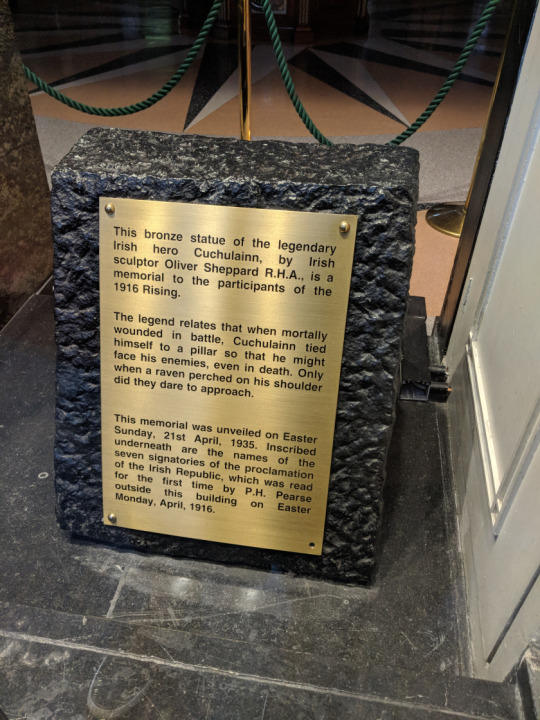
If you take the time to walk around Dublin you will see evidence of the hardship and sacrifice the Irish have endured achieving their independence. The Easter Rising was notable for its sniper duels. It was a way of picking off combatants who strayed into sight, although sometimes targets were picked indiscriminately. For the rebels, it was essential to their survival that enemy snipers and machine gun nests were disrupted and forced to move position.
The picture below was taken from inside of the Dublinia Museum that highlighted the Viking and Midevive history of Dublin. In 1916, Dublinia (then the Synod Hall) was one of the outposts used in the Rising. Three armed rebels from the socialist Irish Citizens Army (ICA) were stationed here. Their task was to delay expected British troops heading to Dublin Castle where they had planned a take-over.
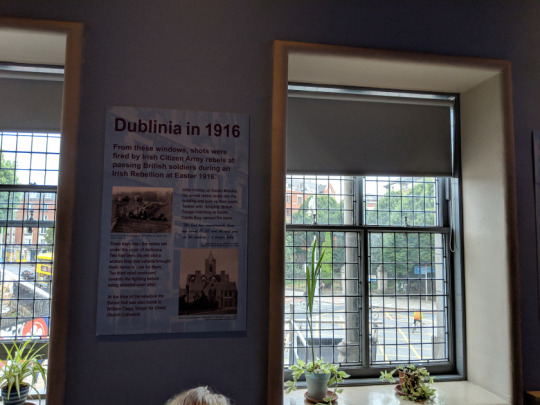
The Anglo-Irish treaty was signed in 1921 ending hostilities between the IRA and the British. The Treaty gave the 26 southern counties of Ireland now the Irish Free State a considerable degree of independence, however, Northern Ireland would remain part of the United Kingdom. Some were not happy with the arrangement. A civil war broke out between pro-treaty forces and anti-Treatyites, or republicans. T The war ended in 1924, but tensions would still carry on over the years. As you look toward the North, it is apparent even today there is still desire for a united Ireland.
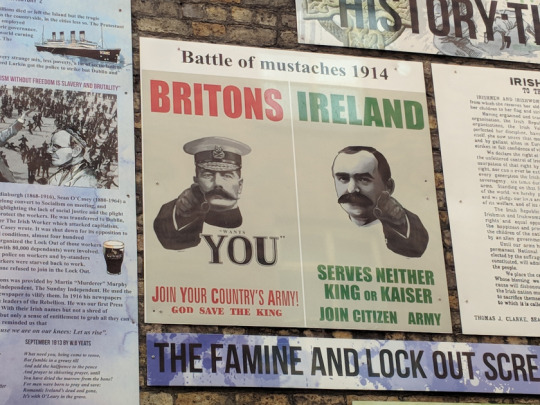
A Walk Through Belfast’s Troubled Past: The Dublin Connection In order to understand the sectarian violence that plagued Belfast and Northern Ireland for many years, you have to start one hundred and three miles to the South in the city of Dublin.
0 notes
Text
The Dog and Duck, Haymarket, Sydney: 1815-1891
The Dog and Duck, Haymarket, Sydney: 1815-1891
George Street South today, showing the location of the Dog and Duck. The multi-storey dark coloured building to the left of The Great Southern Hotel is where the inn once traded.
By MICK ROBERTS©
The partially obscured Dog & Duck (circled) shortly before demolition.
FOR over 80 years the Dog and Duck was a landmark pub on George Street Sydney.
A coach terminus for travellers between country NSW…
View On WordPress
#&039;Defender&039;#Ambrose McGuigan#Apollo&039;s Garden#Billy Bull#Black Swan George Street Sydney#Bradberry&039;s farm#Brickfield Hill#Capital Terrace#Catherine Johnston#Chase Mallard#Cherry Tree#Church of St. Lawrence#Daniel Harrald#Daniel O&039;Connell#David H. Daley#Dog and Duck#Edward Barrett#Edward Fitzgibbon#Edward Oatley#Edward Roberts#Frances Murphy#George Street#Gibber Jack#Golden Tree#Haymarket#Horderns and Hancock&039;s Tower#Horse and Jockey Hotel George Street Sydney#Jack Smith#James Hogan#John Bayliss
0 notes
Link
Moore Street and Upper O'Connell Street are set to undergo a major revamp under new plans for the area.UK property groupHammersonhas scraped existing planning permission for a 1.25 billion enclosed shopping complex on the six-acre site in favour of an ope
0 notes
Text
Northeast Storm Hazleton Patrolman Walt Mazur places a ticket on the snow covered windshield of a vehicle whose driver violated the snow emergency parking ban and parked on the wrong side of North Wyoming Street in Hazleton, Pa., Wednesday, March 21, 2018. A spring nor'easter targeted the Northeast on Wednesday with strong winds and a foot or more of snow expected in some parts of the region.(Ellen F. O'Connell/Hazleton Standard Speaker via AP)
Gov-auctions.org - #1 Government & Seized Auto Auctions. Cars 95% Off!
Winter Storm Toby has paralyzed the East Coast of the United States making travel hazardous, shutting down the federal government, canceling thousands of domestic flights, and causes some states to declare emergencies.
Legally Concealed Courses - Firearms, Concealed Carry, Survival
from Regina Perez RSS Feed http://feedproxy.google.com/~r/breitbart/~3/qtc_fGlGSxY/ via IFTTT
0 notes
Text
#OTD in 1976 – Tens of thousands defied a ban on commemorating the heroes of Easter 1916 at the GPO in Dublin.
In 1976, the 60th anniversary of the Rising, the southern state and the republican paramilitaries – particularly the Provisional IRA were in frank confrontation. The Irish government banned that year’s proposed Easter parade by republicans under the Offences Against the State Act – its anti-terrorist legislation. Just ten years after the state’s own bombastic commemoration of the Rising in 1966,…

View On WordPress
#1916 Easter Rising#60th Anniversary#Dublin#GPO#History#History of Ireland#Ireland#Irish History#O&039;Connell Street#Offences Against the State Act#Provisional Irish Republican Army#Stephen’s Green#The Irish Times
11 notes
·
View notes
Text
O'CONNELL STREET
O’CONNELL STREET
O’CONNELL STREET DUBLIN – DECEMBER 2019
O’Connell Street is Dublin’s main thoroughfare. It measures 49 m (54 yds) in width at its southern end, 46 m (50 yds) at the north, and is 500 m (547 yds) in length. During the 17th century it was a narrow street known as Drogheda Street (named after Henry Moore, Earl of Drogheda). It was widened in the late 1700s and renamed Sackville Street (after…
View On WordPress
#2019#A7RIV#December#Drogheda Street#Dublin Streets#Earl of Drogheda#Fotonique#Henry Moore#Infomatique#Ireland#main street#O&039;Connell Street#Sackville Street#Sony#street#Streets Of Dublin#William Murphy
0 notes
Text
Real Photo of Photo Collage of Trams on the side of a Bus—Dublin, September 2016.
Real Photo of Photo Collage of Trams on the side of a Bus—Dublin, September 2016.
I’m serious. An historic photo of trams on O’Connell Street has been displayed on the side of a tour bus that’s on for the 100th anniversary of the 1916 Easter Rising in Dublin. Also, a more modern image of tram is part of the collage of images. My view is an abstraction. I exposed this using a Nikon F3 with 50mm Nikkor lens on Ilford FP4 (35mm black & white film). I processed it in Kodak HC110…
View On WordPress
0 notes
Text
Ceol Nua: The Crayon Set - O'Connell Street, 1916
Ceol Nua: The Crayon Set – O’Connell Street, 1916
The Crayon Set pay tribute to 1916
For the weekend that’s in it, here’s more amazing music from The Crayon Set; paying tribute of our national heritage.
Released around Easter Weekend, we thought we’d give it a plug on the actual 1916 anniversary.
O’Connell Street 1916 is once more a testament to the incredible song writing skills of The Crayon Set. It’s a heartfelt story of real life Dublin;…
View On WordPress
0 notes
Text
Swords to Dublin via Public Express Bus
Swords to Dublin via Public Express Bus
After spending most of the morning dealing with the Rental Car and learning how to adjust to the TDI Blue Motion Automatic car which disengages the engine every time you stop at a street light or stop sign, we finally made it to our first bed & breakfast; San Augustine B&B. A quick chat with the proprietor, an exchange of pleasantries about the “house rules”, then we are handed a key for entry…
View On WordPress
#bed & breakfast#bus stop schedule#cluster of houses#Dublin#Dublin Ireland#Express Bus#Ireland#O&039;Connell Street#Public Transit#rental car#Saint Columba&039;s Church#snapping photos#South Korean#subway map#Swords#Swords Ireland#Swords Round Tower#TDI Blue Motion
0 notes
Text
Wandering Ireland' streets
Wandering Dublin' streets #dublin #ireland #streetphotography
During our vacation in Ireland, we had several occasions for street photography. Neither me or my wife are street photographers, per se, we’re more travel oriented if you like to categorize.
Still, Dublin has become a city full of life, tourists and…
View Post
0 notes